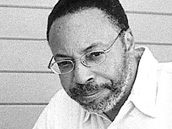Writings / Reviews
Fiction, Poetry, and Literary-Critical Reviews
George Elliot Clarke
Manguel’s Homer
by Alberto Manguel
Vancouver, BC: Douglas & McIntyre, 2008.
In its “Books That Shook The World” series, Vancouver publisher Douglas & McIntyre properly includes the Greek poet Homer’s epic poems, The Iliad and The Odyssey, and enlists the consummate belle-lettriste Alberto Manguel to give us the “Biography” of the poems, that is to say, the history of their reception, or, rather, influence.
Homer’s The Iliad and The Odyssey: A Biography ($22.95) deserves to be read alongside other series titles, such as The Bible (as digested by Karen Armstrong) and Thomas Paine’s Rights of Man (as engaged, not so ironically, by the liberal warmonger Christopher Hitchens), for the subject poems are, as the Encyclopedia Britannica broadcast decades ago in its own publication series, “Great Books.” Manguel verifies the claim, producing example after example, of the debt the Western (or, more precisely, Mediterranean-derived) imagination – literary, philosophical, theological, political, and military – owes two books that, yet, “have no clear starting-point and no identifiable creator.” The tales themselves – of war (The Iliad) and long journeying (The Odyssey), both linked by love (possibly trivial in the first instance, but noble in the second) – may have been the product of one man (or woman), who remains, in essence, a mystery. Or they may have been composed collectively, over generations and centuries, by wandering singers rendered anonymous by the brand name, “Homer.”
No matter: “the classical picture” is that of “the blind bard, travelling from place to place, singing his marvelous poems.” And “his” creations have influenced both knowledge (archaeology and history) and wisdom (theology and philosophy) because they show mortals behaving, occasionally, nobly, and gods behaving, frequently, badly. For 2,500 years – or 125 generations – these poems have been as durable and as inspiring as scripture, mainly because The Artist(s) Still Known As Homer has freely fused the human and the divine and presented images of life, of reality, of whims and willpower, courtship and massacre, that remain awesomely true. The Iliad tells of nations that go to bloody battle because the prince of one has stolen away the head-turning queen of another. The Odyssey tells of the decade-long, danger-fraught, delay-ridden return journey of one of the Trojan War victors to his homeland, where he goes unrecognized and is insulted, and where rapacious suitors besiege his faithful wife and promise to murder his son. In prose that is always lucid, magisterial, and touched with its own poetry as well as that of the sundry authors he cites, Manguel’s history of the success of Homer is a tour of masterpieces, the touchstones of Western consciousness.
Even in ancient Greece, it was recognized that “A school without Homer was not a school; it was a learning place without the means of learning excellence.” Although poetry-distrusting Plato banishes bards from his more-or-less fascist (but, happily imaginary) Republic, still “there are 331 references to Homer and his works in Plato’s Dialogues.” The Roman imperialist poet Virgil finds his groove by arguing that Italians descend from Homer’s Trojans; Muslim scribes both translate Homer and turn some of his tales into the adventures of Sinbad; Dante’s genius derives from Homer via Virgil, a point Manguel illustrates by studying their common use of autumn leaves to represent our mortality.
Homer survives most readily as poetry – in translation and in new versions of the classic stories. So, Alexander Pope sets Homer in surprisingly effective rhyming couplets, while the Anglo-Caribbean Nobel Laureate Derek Walcott retells the Odyssey in his Omeros (1990), but with a twist: His “three-line stanzas” echo Dante; his poem’s “idiom is a mixture of contemporary English and Creole and, though its characters bear the names of Homer’s heroes, they are also the names that slave-owners commonly gave to the black population of the islands….”
Manguel’s history of the use of these poems, as art and as story, reminds us that all human history is nothing but a set of stories, some more mythical than others, endlessly retold. So, the 2003 invasion of Iraq replays the Trojan War: bloodshed for nothing.
Trans.Can.Lit: Resituating the Study of Canadian Literature
by Smaro Kamboureli & Roy Miki, editors
Waterloo: Wilfred Laurier UP, 2007.
Edited by well-known Canadian literary critics Smaro Kamboureli and Roy Miki, Trans.Can.Lit: Resituating the Study of Canadian Literature (Wilfrid Laurier University Press), is a latter-day, generational assessment of the state of research into English-Canadian literature, following its establishment – as a job-creating, grant-giving, and book publishing institution and industry – in the early 1970s.
Kamboureli believes literature is always bound up with politics (the “polity”); hence “CanLit” now speaks to and about Canada as “an unimaginable community,” that is to say, as an unfinished project, “always transitioning.” If so, then Northrop Frye’s famous question, “Where is here?”, has not been superseded. Apparently, scholars are still trying to define this bit of real estate, though now with reference to (and sometimes regard for) First Nations, Gay and Lesbian, and minority cultural voices.
A baker’s dozen of papers presented at a 2005 conference, Trans.Can.Lit. attempts to tease out the ‘new’ questions that interest literary Canadianists. Diana Brydon asks that Can Lit specialists read “our national literature in global contexts and in dialogue with Indigenous (First Nations) concerns,” and she proposes that we study “the texts emerging from the new South Africa, as it undergoes its own metamorphoses, from an apartheid settler state to a multicultural democracy.” Rinaldo Walcott wonders whether there is space in “CanLit” for the “Black (Gay), dual citizen, sociologist, cultural critic.” He calls for an “academic revolution” to oppose “knowledge production as merely industry and business.” Peter Dickinson celebrates “TV ‘wedding fairy’ Scott Thompson – or … his alter-ego, Buddy Cole” as someone who can “bitch-slap” us out of our “trance” (i.e. our alleged love of civility, Britishness, and monotone utterance).



